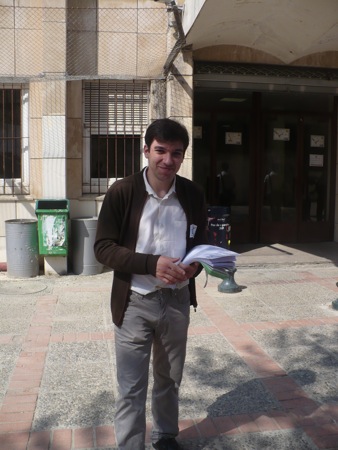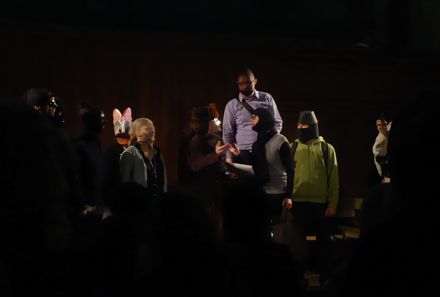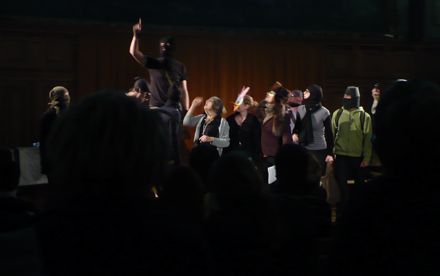I’ve been working on a paper about the failure of left-wing internationalism at the “European counter-summits” (at least the two that I was able to observe in 2010 and 2011), and I’ve gotten interested in this love letter to the organizers of the 2011 Dijon counter-G8 university summit. A student left it on the ground in marker as they left the event, which was politically pretty unsuccessful, as my paper explains.
Continue reading “Dijon vous craignez”
Tag: student activism
Testimonial from French protests
So as everyone who reads the news has probably heard, there has been a major “social movement” here the last few weeks, basically opposing the government’s reform of the pension system. There have been a number of street protests, major strikes of public transit and railroad workers, and fuel shortages because of industrial strikes. I’m not going to take the time to give links to these ongoing stories, because you can look it all up on google. (I recommend French-language coverage, if possible, and otherwise maybe the BBC. Americans seem to be prone to idiotic analyses like this one.)
To be honest, as an ethnographer, I haven’t been extremely curious about this whole political affair; it’s only peripherally about the universities, and I’m mainly interested in the politics of the university system. And I’m not the only one who feels separate from this movement: at a faculty activist meeting a week ago, teachers commented that their concerns about the institutional situation were radically different from their students’ involvements in the pension question, and they weren’t sure (at that point) what points of commonality with the students they were going to find.
University discussion of the movement has, nonetheless, been ongoing, and I was particularly interested in one sociology student’s testimonial from the barricades in Lyon. I’ve taken the time to translate it; there’s something important to learn, I think, from stories of what happens when privileged, educated people suddenly find themselves subject to irrational and overwhelming state violence.
Thursday, October 21, 2010. Testimony of events on Place Bellecour, Lyon.
I arrived around noon at Place Bellecour, accompanied by some student friends. A protest was supposed to start at 2pm, on Place A. Poncet just beside Place Bellecour, with college and high school students, partnered with the CGT [a major union] and SUD [a left autonomist union]. A number of young people were there, mostly high schoolers and middle schoolers. You crossed a police cordon to enter the square. There were several dozen of them at every exit from the public square, which is one of the largest in France. They were armored from head to foot, with helmets, shields, nightsticks, pistols… There was also a truck from the GIPN (National Police Intervention Group, who had an armored truck and wore masks) and two anti-riot water cannon trucks. A helicopter surveyed the site from a low altitude. Half an hour later, after a few stones were thrown towards the police and their vehicles, the cops went into action and fired tear gas grenades. The crowd dispersed.
Fictitious seminar on imaginary disobedience
I’ve been reading some listserve archives from the 2009 strikes and I came across a mocking proposal for an alternative seminar. I don’t think the somewhat heavy-handed irony is likely to get lost in translation.
Hello,
You will find below a proposal for an alternative seminar.
A seminar titled “The expression of social malaise” will be held every monday at 9pm. Drawing on the recent works of our colleagues from Guadaloupe and those of our working-class neighbors from 2005, we will learn to generate acts of symbolic, media-ready disobedience.
The seminar will begin with a theoretical exposition of alternative means of expressing social malaise (occupying train stations and commercial buildings, setting garbage cans on fire, vandalizing bus stops). The practical application of these means will be open for discussion, and there will be a presentation on indispensable information for strikers (about the cracks in the riot police’s armor, protecting yourself from tear gas grenades, and practical legal advice).
The second part of the seminar will be dedicated to physical exercises relevant to this expression of social malaise (exercises in dispersion, intensive running, basics of close combat, unarmed and with blades, throwing paving stones, fabricating Molotov cocktails, and so on).
Course credit for students will involve an individual and spontaneous student project, preferably of a practical nature. This seminar can be counted for credit either in Law or in Communications.
Participants from the experimental centers of Clichy-sous-bois and Villiers-le-Bel will intervene in the seminar.
A and M
PS: If this proposition is taken seriously, the organizers of the seminar are not to be held responsible.
Some of the listserve participants then chimed in with suggestions on the grading system; whereupon a professor suggested rather more seriously that even in fun, such discussions probably shouldn’t be left in the public record.
It’s probably superfluous to note, at any rate, that the humor of the proposition apparently derives from the juxtaposition between the register of illegal street violence and academic discourse. The former is mockingly dignified by the latter; the latter is profaned by the former. One is left wondering, though, what sort of impulse towards imaginary disobedience motivated the authors, and what sort of social function this humor is serving or undermining.
Heterosexuality, the opiate of the people
Yesterday was the big day of student elections at Paris-8, just as there were elections in Aix that I covered a few weeks ago. But in the thick of the afternoon I was delighted to see that not all the groups were handing out election fliers, for right at the campus entrance was a new feminist collective. Such groups seem somewhat less common in France than in the US, where gender-based activism, while far from mainstream, is quite usual. And their flier, when I sat down later to look at it, turned out to be a good one:
Questionnaire on Sexuality
- Where do you think your heterosexuality comes from?
- When and under what circumstances did you decide to be heterosexual?
- Could it be that your heterosexuality is only a difficult and troubling phase that you’re passing through?
- Could it be that you are heterosexual because you are afraid of people of the same sex?
- If you’ve never slept with a partner of the same sex, how do you know you wouldn’t prefer one? Could it be that you’re just missing out on a good homosexual experience?
- Have you come out as heterosexual? How did they react?
- Heterosexuality doesn’t cause problems as long as you don’t advertise these feelings. Why do you always talk about heterosexuality? Why center everything around it? Why do the heterosexuals always make a spectacle of their sexuality? Why can’t they live without exhibiting themselves in public?
- The vast majority of sexual violence against children is due to heterosexuals. Do you believe that your child is safe in the presence of a heterosexual? In a class with a heterosexual teacher in particular?
- More than half of heterosexual couples who are getting married this year will get divorced within three years. Why are heterosexual relationships so often bound for failure?
- In the face of the unhappy lives that heterosexuals lead, can you wish for your child to be heterosexual? Have you considered sending your child to a psychologist if he or she has turned out to have heterosexual tendencies? Would you be ready to have a doctor intervene? Would you send your child to in-patient therapy to get him or her to change?
Continue reading “Heterosexuality, the opiate of the people”
The activist poise
In case you wondered what campus activists look like in Aix, here are some people who were distributing tracts for the election I wrote about earlier.
This fellow was from UNEF. As I asked to take his picture, an older man he was talking to edged back out of the frame, and the activist drew himself up in a sort of pose.
Is the university burning?
Last month I went to a debate organized at the Sorbonne, “Is the university burning?” (L’Université brûle-t-elle ?) Appropriately, it ended in chaos; but midway through, there was a bit of performance art.
Actors in masks, some with stockings over their heads, made a pretend argument for burning the university. For the foreigners in the audience, a disjointed translation of their performance was projected on a screen like so:
We want Godard, Proust, the Princess of Cleves, not commercial trash culture
Let us burn the university! No! The University is not for profit! It is there to create more freedom, more riches (that are not material), “Latin is useless and that’s why it’s beautiful!” against the death of “dead languages”, let us burn the university! In the name of all erasmus students, I would like to say I had no time to write a speech, because I work to pay my way and so we say “let us burn the university”!
[They shouted their discourse from the stage.]
Experiment time! First we will build a fire, the first spark. Take your sheet of paper, fold it over, then again, and cut it, and lick it and keep your strip of paper (etc),
[The actors circled back into the aisles of the large lecture hall with sheets of paper, with which they mimed an effort to create fire.]
It doesn’t work!!!!!
[—they said as they pretended to discover that rubbing two pieces of paper together doesn’t make a spark.]
It would be crazy; it would be like killing oneself; like putting one’s head in the freezer, like throwing oneself under a car, like…
[As if they were delighted to discover that they didn’t need to burn the university after all… but the translation trailed off and the actors came through the aisles hugging the audience. Even including the ethnographer, yours truly.]
What makes students jump
All week, student protests have continued in France, in conjunction with a much larger and more economically important strike by transportation workers. Liberation has an article that juxtaposes “what the law says” with “what students fear.” It’s the clearest introduction to the politics of the confrontation I’ve seen so far – in spite of everything that it probably leaves out about the sociopolitical context. Let me summarize the major points of contention:
- State disengagement. The law mandates that universities manage their own budgets (a major innovation in the French context); it increases the power of the university president and diminishes the power of currently-existing administrative councils. Students fear that this is just an excuse for the state to abandon universities to their own devices, decreasing state funding for higher education.
- More social selection. The law mandates “l’orientation active,” which is defined as “aider le lycéen à faire un choix d’orientation éclairé,” i.e. helping the lyceén to make an enlightened choice of their program of study. Students view this as a process of “sélection,” which corresponds loosely to what in American universities is called “selectivity,” that is, the screening process by which some students are chosen over others. And they view this as a disavowed means of reproducing social inequality. (See also a longer analysis of social selection at café pédagogique.)
- Increased registration fees. Official statements to the contrary, students say it’s obvious that in the absence of state funding, universities will look to their students for financial resources.
- Closing of fields of study. The law says nothing about this, but the worry is that universities will be inclined to get rid of un-profitable fields. Interestingly, it seems to be students in human sciences and languages who are the most worried about the law in general. Also, Libération comments that:
Derrière cette crainte, il y a aussi le refus de la professionnalisation des filières, des licences pros trop liées aux besoins du marché, et la volonté de défendre une université lieu de transmission du savoir.
Behind this fear, there’s also a refusal of the professionalization of academic fields, of professional degrees too closely linked to the needs of the market, and the will to defend a university as a place of knowledge transmission.
The whole problem of the university’s general societal role comes up here, and of its dependence on, or partial autonomy from, its economic circumstances. Even in the U.S., there are periodic conflicts over whether college education should be directly vocationally oriented. It’s remarkable that French students, not just professors (whose self-interest is obvious in this context), would defend the right to an economically irrelevant field like philosophy.
- The two-speed university. According to the law, each campus will be treated equally. Students suspect, however, that there will be increasing differentiation between major Parisian research universities and small provincial teaching campuses.
Last month, some visiting French anthropologists suggested that I look into the workings of the Pécresse law as it takes effect. Along these lines, I’m tempted to think of this Libération article as a set of five empirical hypotheses whose truth will emerge over the coming years.
Student activism in Serbia
Jessica Greenberg‘s 2007 dissertation, “Citizen Youth: Student Organizations and the Making of Democracy in Postsocialist Serbia,” chronicles the students’ response, among other things, to the still ongoing European Bologna Process. Apparently, in contrast to Western Europe, where at least some professors view it as an instrument of neoliberalization and creeping audit culture, the students saw it as a welcome source of needed reforms. (Serbian professors and administrators, however, remain more equivocal on the topic.)
Greenberg starts with a general history of Serbian universities, saying that they were “decentralized,” with each faculty an autonomous legal entity. (Universities in Serbia date from this century, several having been started in the 1960s and 70s.) Apparently they were an instrument by which the state could consolidate its power — although the threat of subversion from within the universities remained a real concern to state power, and the university thus became “a highly politicized site of critique and protest.” Greenberg adds that “student protest was often exacerbated because expectations created by ideals of higher education were constantly foiled by social and material practices within the everyday workings of the university” (7). (Of course, this is true in America as well, and in France – although I wonder whether it also works in reverse. Is it possible that our social practices are constantly being foiled and disrupted by our dysfunctional educational ideals?)
Serbia is an interesting case of student activism, anyway, since it seems that students had a major role in the defeat of Milosevic in 2000. But after this victory, the student movement lost its unity, refocusing itself on reform of universities. In the context of traditional pedagogy and limited institutional resources, “many student leaders saw the forms of standardization, credit systems, quality assurance and transparency of testing and educational requirements as the solution” (14). Moreover, it was evidently viewed as “a way to make Serbia more properly European” (15). Indeed, Greenberg’s work centers on how Serbian students work through the difficulties of citizenship and democratic organization in their universities. Unfortunately, from the introduction, I get the impression that she doesn’t investigate the university as such, as an institution, as a complex social structure – it seems to be very much cultural anthropology. But for the time being, I just want to emphasize this fascinating case of a neoliberal, regional reform – the Bologna process – being reused and reappropriated in local politics.


